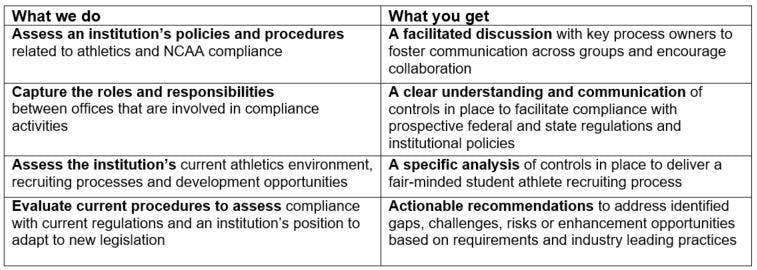
The future of name, image and likeness in higher education
Name, image and likeness (NIL) are three elements that make up the legal concept known as “right of publicity.” The right of publicity, sometimes called “personality rights,” is an individual's right to control and profit from the commercial use of his/her name, image or likeness.
Examples of NIL-related activities
- Advertising or promoting a business
- Autographs or photographs
- Personal appearances
- Sales of merchandise with name, image or likeness
- Social media endorsements
- Representation in movies, television or video games
Why is NIL important in collegiate athletics?
In one word: amateurism
An amateur athlete is “someone who does not have a written or verbal agreement with an agent, has not profited above his/her actual and necessary expenses or gained a competitive advantage in his/her sport.” Allowing student athletes to profit from their name, image or likeness is a direct threat to amateurism, one of the major reasons the National Collegiate Athletic Association (NCAA) was created.
NCAA compliance and regulations
The NCAA stands by its amateurism model and does not permit student athletes to be paid for their athletic performance (e.g., accepting a cash prize for winning a race) and restricts a student athlete’s ability to profit from the use of their name, image and likeness. Restrictions vary between Division I and Divisions II/III colleges and universities. As it currently stands, Division I student athletes may not use their name, image or likeness to promote or endorse a commercial product or service, even if they are not paid to participate in the activity. In Divisions II and III, student athletes may use their name, image or likeness in promotional activities unrelated to athletics, including promoting or endorsing commercial products or services.
Expected changes to NCAA’s NIL rules
The NCAA, having recognized the need to modernize, is committed to creating more flexibility in NIL rules. However, in January 2021, it delayed votes on new legislation pending discussions with the U.S. Department of Justice around antitrust concerns.
Proposed rule changes are expected to permit athletes to earn money from endorsements both related to and separate from athletics and compensation for other opportunities, such as social media “influencer” activity, business ventures and personal appearances, provided there is no institutional involvement or the use of its trademarks/logos and student athletes are not compensated for their athletic participation. There will be compliance challenges to ensure that:
- Compensation for NIL is not masked as payments for any athletic participation
- Institutions and conferences do not play a role in NIL activities and the role of third parties are regulated
- NIL opportunities are not used as recruiting tools
Legislation
As of May 2021, at least 15 states have signed official NIL legislation into law, some of which are set to take effect as soon as July 1, 2021. This legislation allows the states to permit players to profit from their name, image and likeness, a violation of existing NCAA bylaws. A number of bills have been introduced in Congress but none have been signed into federal law. With the states governing NIL and an absence of consistent treatment of NIL activity nationally, schools in states with more favorable NIL laws could benefit from advantages in recruiting top talent.
The future of NIL
Similar to the way professional athletes and celebrities are connected to commercial opportunities, companies and brands are expanding their services and new businesses are forming in anticipation of major changes to NIL rules. Student athletes will need a trusted avenue to access NIL opportunities easily and without great barriers. Student athletes will need to know how they can leverage trends like social media or non-fungible tokens (NFTs) without violating any rules that would jeopardize their athletic eligibility. The NCAA, its conferences and higher education institutions will also need a way to monitor for compliance without unreasonably restricting opportunities for student athletes.
Baker Tilly can help
We can help your institution take a proactive approach to evaluate the current state of your policies, processes, internal controls and definitions related to athletics and NIL to identify opportunities that align with the new changes.
What name, image and likeness mean for college sports. And how the NCAA is turning to student-athletes to navigate a path forward (Stark-Mason, 2021)
According to the NCAA, “there are several exceptions that allow the use of a student-athlete’s name, image or likeness in promotional activities. These include charitable, educational or nonprofit promotions; media activities; national governing body promotions; and camp and congratulatory advertisements.” Other exceptions are granted by means of waivers. According to the NCAA, "more than 200 waivers have been submitted in Division I [since 2015] to allow student-athletes to promote their own business or product — such as a book they wrote or a clothing line they created — and 98% of those waivers have been approved.”

